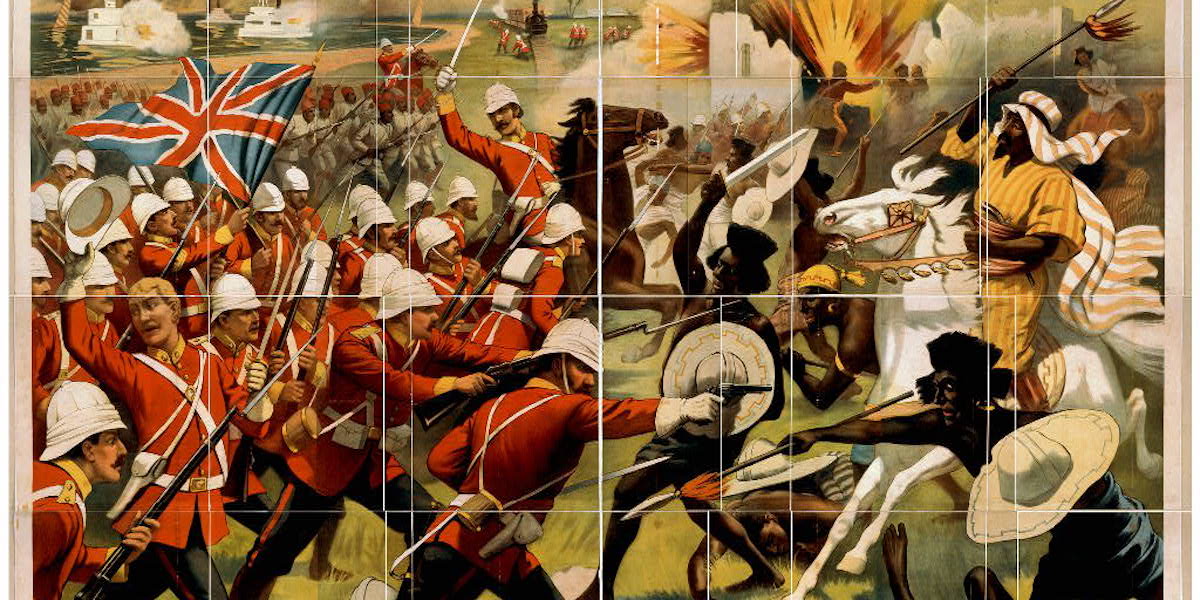As Black History Month draws to an end it is important to reflect on the European conquest of Africa. Is there a connection between colonial rule and the continent’s impoverishment today? Should the beneficiaries of European imperialism pay reparations or at least acknowledge the injustices committed?
When thinking about these questions it’s important to look at my city’s contribution to this history. For example, few are aware that a Montréaler played key role in expanding British colonial rule across Africa.
Sir Edouard Percy Girouard rose to fame by helping Britain conquer Sudan. The Royal Military College of Canada graduate and former Canadian Pacific Railway engineer oversaw the construction of two hard-to-build rail lines from southern Egypt towards Khartoum, allowing British forces to bypass 800 kilometres of treacherous boating up the Nile. Able to transport ammunition and guns into Sudan, the British killed 11,000 and wounded 16,000 in the final battle at Omdurman (only 48 British/Egyptian soldiers died).
At an 1899 dinner in this city, Canadian minister of militia Frederick Borden celebrated Girouard’s contribution to the slaughter in Sudan. “Major Girouard has added luster, not only to his own name, but also to Montréal, to the dominion of Canada.”
During the 1899–1902 Boer War Girouard was director of imperial military railways. Afterwards he became Commissioner of Railways for the Transvaal and Orange River colonies, which are now part of South Africa.
Girouard’s efficiency in the Sudan and South Africa impressed British under-secretary of state Winston Churchill who promoted the rail expert to high commissioner of Northern Nigeria in 1906. Two years later Girouard became governor of the colony, sparking a Toronto Globe headline that read: “Northern Nigeria: the country which a Canadian will rule.”
Girouard enjoyed lording over the 10 to 20 million Africans living in the 400,000 square mile territory. In a letter to his father, Girouard described himself as “a little independent king.”
The Montréal born “king” justified strengthening precolonial authority by stating, “if we allow the tribal authority to be ignored or broken, it will mean that we…shall be obliged to deal with a rabble, with thousands of persons in a savage or semi-savage state, all acting on their own impulses.”
Local chiefs provided forced labour to construct Girouard’s signature project, a 550-km railway stretching from the city of Kano to the port of Baro. Designed to strengthen Britain’s grip over the interior of the colony, the rail line also provided cheap cotton for the textile industry in England.
After Northern Nigeria, Girouard became governor of British East Africa from 1909 to 1912.
Girouard’s unchecked zeal for efforts to turn today’s Kenya into a “white man’s country” eventually prompted the Colonial Office to relieve him of his duties. When a prominent British settler confessed to the murder of an African suspected of stealing a sheep, a white jury rejected the judge’s counsel and acquitted the killer after five minutes of deliberation. London wanted the assailant deported, fearing political fallout in the UK from the judicial farce. Girourd not only refused to condemn the murder and the jury’s decision, he attempted to block the deportation.
Girouard’s indifference to this crime caused a rift with London, but it was his underhanded abrogation of the sole treaty the East African protectorate had ever signed with an African tribe that spurred his political demise. Weakened by disease and confronting an ascendant Britain, in 1904 the Masai agreed to give up as much as two thirds of their land. In exchange, the cattle rearing, semi-nomadic people were assured the fertile Laikipia Plateau for “so long as the Masai as a race shall exist.” By Girouard and Britain’s odd calculation, the agreement expired fewer than seven years later. About 10,000 Masai, with 200,000 cattle and 2 million sheep, were forced to march 150 kilometres southward to a semiarid area near German East Africa. An unknown number of Masai and their livestock died on this “trail of tears.”
In Origins of European Settlement in Kenya, M. P. K. Sorensen describes the Montréaler’s effort to sell London on scrapping the agreement. “Girouard had to abrogate the 1904 Masai treaty and pretend to the Colonial Office that the Masai wanted to move south. At the same time he had to disguise the fact that he was acting in the interests of the settlers, some of whom had been promised land on Laikipia.” Girouard’s deception and abrogation of the treaty caused tensions with the Colonial Office, which would be his downfall.
The son of a long serving Member of Parliament and Supreme Court of Canada judge, Girouard remained honorary lieutenant colonel of the Chicoutimi-based 18th (Saguenay) regiment throughout his time in Africa. In 1903, Montreal Herald readers ranked Girouard seventh among “the ten greatest living Canadians.” A mountain in Banff National Park, as well as a plaque and building at the Royal Military College are named in his honour. In 1985 the Gazette published an article headlined “Maybe Africa needs another Percy Girouard.”
Perhaps it is time to consider Girouard again, but in a less laudatory fashion.
Please chip in to keep stories like these coming.
Image: Wikimedia Commons




